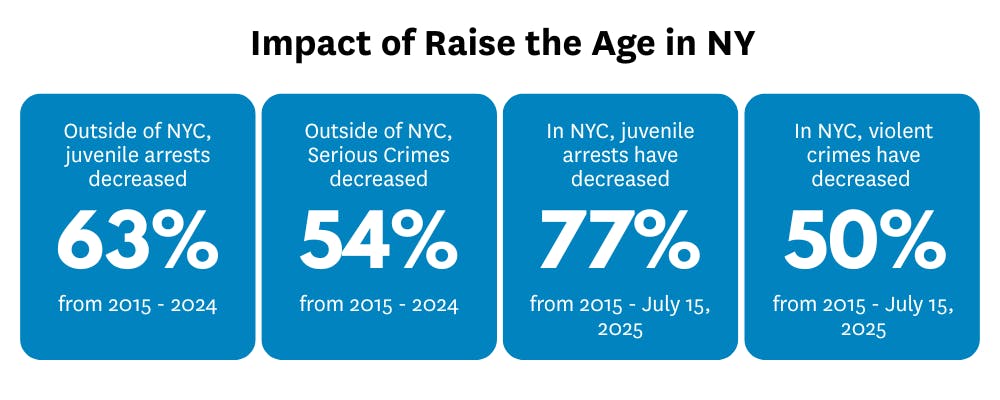

What’s Next for Youth Justice In New York?
Insights
November 19, 2025
CCC remains focused on advancing statewide policies that strengthen youth services and decrease youth justice involvement. In the insight below, we discuss critical data and uplift budgetary and legislative solutions designed to enhance upstream supports for young people and reduce systems involvement.
Raise the Age: Building on Success
CCC was instrumental in the 2017 passage of Raise the Age (RTA) legislation that raised the age of criminal responsibility to 18 in New York and prioritized rehabilitation and community-based supports for youth over incarceration.
Despite false narratives claiming RTA has caused an increase in youth crime, and the Raise the Age Coalition shows that since passage of RTA, youth crime has decreased across New York over the past 10 years:

While these trends demonstrate important progress, New York State has failed to fully deliver on its promise to fund community-based services and programs that provide alternatives to incarceration and reentry programs for young people. In fact, as of March 2024, less than one-third of the $1.5 billion set aside for localities to implement the Raise the Age law has been used. Additionally, NYC – which represents about half of the state’s youth justice population—is currently ineligible to receive this critical funding.
In close partnership with RTA allies including elected leaders, advocates, and community partners CCC has joined efforts to establish a Youth Justice Innovation Fund (YJIF) that would invest $50 million in community-based programs across New York— including NYC— to provide prevention, intervention, and alternatives to incarceration services to young people 12-25.
Additional Legislative Opportunities to Support Youth
CCC supports three additional legislations that would further protect youth from harmful system involvement and keep them connected to their communities and schools.
#SolutionsNotSuspensions
The Solutions Not Suspensions Act would limit the use of long-term school suspensions and replace them with restorative, age-appropriate approaches to discipline. excessive suspensions disproportionately harm Black and Latine students, students with disabilities, and LGBTQIA+ youth in New York. These responses are often used to address normal, adolescent behavior, as well as too often used to address challenging behaviors that are indicative of unaddressed needs.
Black and Latine students make up 42% NY’s student population but comprise 71% of all students referred to school law enforcement.
Students with disabilities were suspended 87% more often than students without disabilities.
The bill seeks to cap the number of consecutive suspension days at 20, prohibit suspensions for Pre-K through Third Grade, and mandate standards informed by best practices to prevent learning loss, reduce racial disparities, and disrupt the school-to-prison pipeline,
#Right2RemainSilent
Youth justice advocates are seeking important legal protections for children in New York.
90% of young people waive their Miranda rights prior to police interrogation.
Youth are over three times as likely as adults to falsely confess.
The #Right2RemainSilent legislation would legally require all youth under 18 years old to speak with a lawyer before being questioned by police and would ensure that statements taken without a lawyer’s consultation are inadmissible in court.
Youth Justice and Opportunities Act
The Youth Justice and Opportunities Act (YJOA) proposes the creation of a “Young Adult” status for justice-involved individuals aged 19 to 25, which would offer added protections and give courts more discretion in sentencing for alternatives to incarceration. Like RTA, this bill seeks to connect young offenders back to communities and opportunities to rehabilitate. It would also allow for automatic record sealing for eligible young adults to reduce long-term consequences that impact employment and education.
Learn More About Our Youth Justice Advocacy
On Thursday, December 11, CCC will host a webinar focused on youth justice priorities. This webinar is the final in a three-part webinar series – Building NYC’s Future: A Children’s Agenda for the next Mayor and City Leaders – spotlighting fact-based policy solutions to some of the most urgent challenges and charting a course to ensuring every child is healthy, housed, educated, and safe.
In conversation with advocacy partners, Unlocking Potential: A Vision for NYC’s Youth, will highlight policies to increase community connections and prevent justice involvement for young New Yorkers, including the legislation discussed above. We invite you to join us to learn more from CCC and what’s next in youth justice advocacy.


